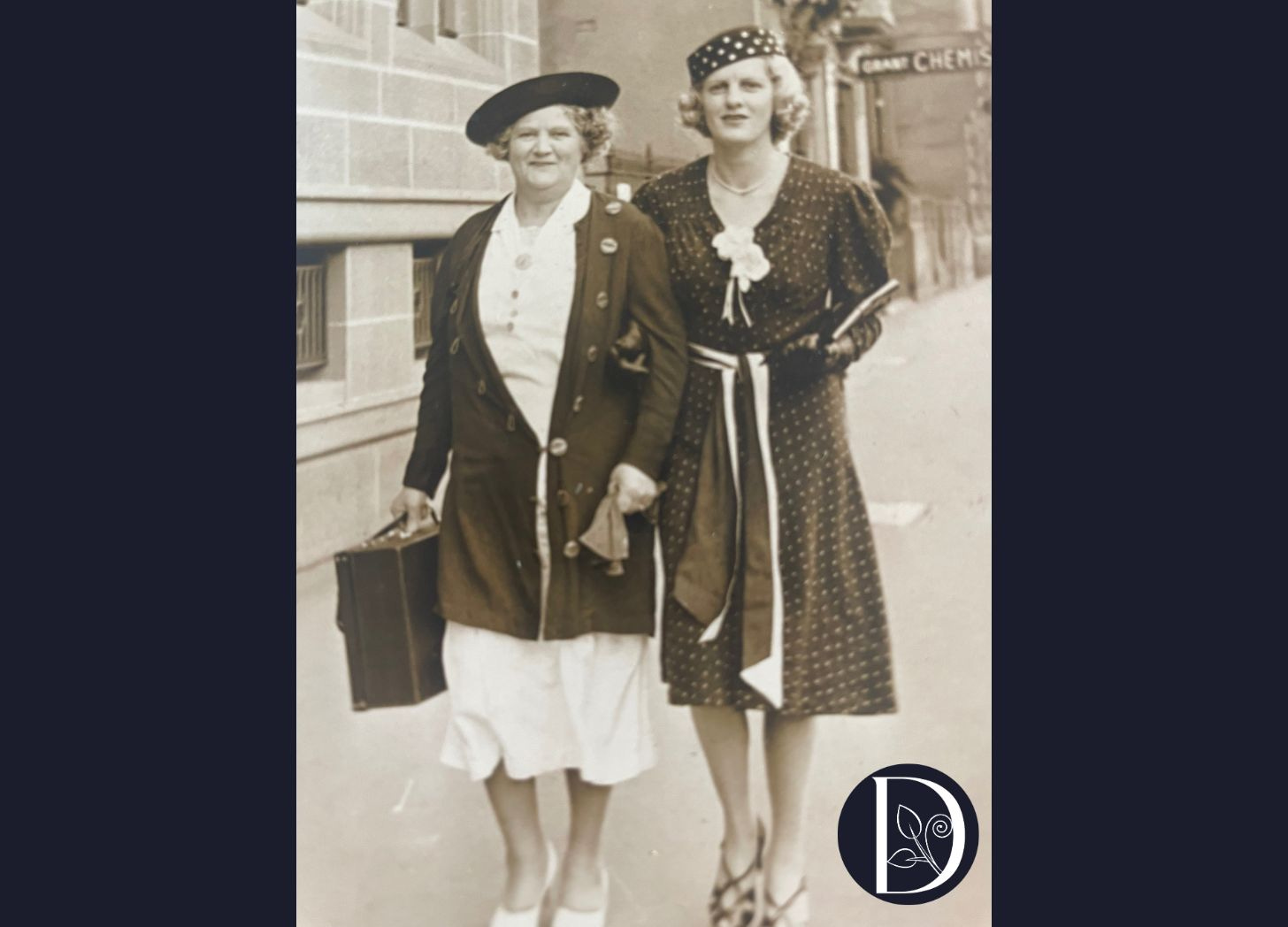Embracing ga-ga
A Dueto ode to Grandma Roma and the fear she could have eased with an advanced care directive
That’s Grandma Roma on the right, with her mum (my Nan, Blanche) all dressed up to go shopping in the city, probably in the 1930s.
Grandmothers are wonderful things. They love you like a mother, but never seem to yell at your or make you go to bed on time.
My Grandma Roma - my father’s long suffering mother who tragically lost her husband when my dad was barely 3 months old - loved to get her hair done once a week and always had shades of purple or pink tinged through her immaculately set hair.
She often wore polyester slacks and smock tops and her favourite colours were gold and royal purple.
She used to give us ‘loll lolls’ - they were lollies - and, oddly, would make us eat our breakfast toast off newspaper so she didn’t have to wash up plates. To this day, I am still baffled by this quirk.
That’s me at the age of 3 with Grandma Roma and some loll lolls. Jelly Tots were my preferred loll loll at that age.
There’s Grandma Roma holding me at my christening when I was only a slug in a blanket. That’s my mum in the sassy houndstooth suit.
Memories become foggy with age, but I can still see Grandma’s face (all nose and chin with sparkling blue eyes that became milky as she moved into her 90s).
Grandma Roma had lots of oddities. She often used to asked me my bra size, though would sometimes call it a ‘bust’.
“How big’s your bust, now?”
“What’s your bra size?”
“I had good bosoms when I was younger. You’ve got a good set on you, though,” she’d tell me, which used to make me utterly cringe with embarrassment.
Don’t ask teenagers their bust size, or they’re likely to bust in embarrassment, Grandma …
Most people fear the ga-ga, but understanding it makes more sense
My grandmother’s greatest fear - beside not having well-set hair - was ‘going ga-ga’.
She recited this fear of hers to me all the time. “I don’t want to go ga-ga … just shoot me if I go ga-ga,” she used to say, pushing another lollie into my hand and asking me if I wanted red jelly or green jelly for dessert (I preferred green, but now that I’m an adult and I know I was just eating sugary animal hooves, I’m kind of grossed out by jelly whether it’s red or green).
The terrible thing is that my grandmother did experience dementia. Enough to force her to move into residential aged care when she was in her 90s.
The more terrible thing is that dementia is the biggest killer of Australian women - and it’s a trend that’s likely to continue as we live longer.
I used to be wracked with guilt about Grandma Roma being in a nursing home, because she had made me swear black and blue not to ever put her in one, especially if she had “lost her marbles”, as she liked to put it.
I was the only responsible adult she could talk to about getting older and what her wishes were, as my father - an only child - was a slightly useless alcoholic who could barely look after himself, let alone his mother or his children.
We all need to be big girls about dementia and what it could mean for our lives, our parents’ lives and our kids.
We can put a plan in place for what a dementia diagnosis might mean for our care, our finances and our loved ones.
My Grandma Roma didn’t understand the need to have an Advanced Care Plan or even a proper Will in place.
Grandma Roma didn’t finish high school and worked in a factory most of her life.
Paperwork and legalities weren’t really her thing.
In fact, after she died I found out she’d never legally married her second husband -they had a church wedding but never quite bothered with the paper work.
Grandma thought talking to me would make her wishes happen, but legally it was my alcoholic father who got to make the decisions … I was only the grandchild and my grandmother hadn’t given me any power to manage her affairs.
So there’s one thing to take away from my grandmother’s amazing life of hard work, hardship and resilience - understand what you need to do to make your wishes a reality.
At Citro, we put together a bunch of resources that are worth a read, including:
There’s even evidence-based health stories on what the science says about avoiding dementia.
Care and love matter more than a dementia diagnosis
Grandma was still pretty with it in her early 90s, but lost interest first in food (the meals on wheels containers overflowed from her fridge as she refused to eat and then refused to throw things out) before her cognitive decline became obvious.
When you love someone, you want them to be cared for and adored, even if things haven’t quite worked out the way they would like.
In the nursing home, Grandma would still hold my hand.
When my first son was born, she would lovingly stroke his cheek, no doubt wishing she could give him some jelly or a loll loll.
I loved Grandma no less for having dementia. In fact, it’s been my experience that you love people more when they are sick (and dementia is an illness that is NOT a normal part of ageing).
For anyone caring for someone with dementia, it’s certainly difficult (as this video below reveals).
I’m pretty sure Grandma Roma will tell you that love and care are almost as good as a loll loll. But advanced planning - and a formal advanced care directive - would taste sweeter if the worst was to happen.








